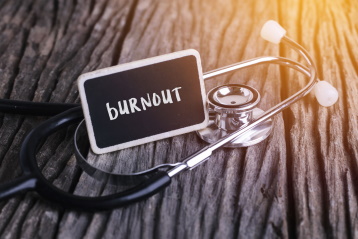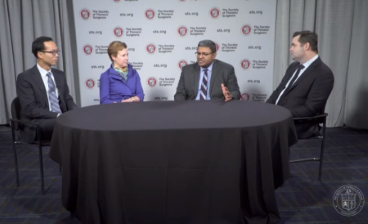Many health care providers are experiencing immense strain due to the COVID-19 pandemic. This article on burnout, prepared prior to the coronavirus spread reaching a critical stage in the US, includes coping tips and strategies that also will be useful for those dealing with isolation, stress, depression, frustration, and other symptoms that are being reported in this COVID environment.
STS News, Spring 2020 — Tackling the growing problem of burnout among cardiothoracic surgeons will require efforts by both health care organizations and individuals to reduce stigma and develop resilience in the face of a challenging workplace environment, according to experts at the recent STS Annual Meeting in New Orleans.
“Burnout is a syndrome characterized by depersonalization, emotional exhaustion, and a decreased sense of personal satisfaction that can be associated with work-related stress,” said Thomas K. Varghese Jr., MD, MS, head of the Section of General Thoracic Surgery, executive medical director, and chief value officer at the Huntsman Cancer Institute at the University of Utah in Salt Lake City.

Results from the 2019 STS Practice Survey, which will be released in the coming months, revealed that more than half of surgeon members in the United States reported experiencing symptoms of burnout.
“As cardiothoracic surgeons, we have competitive drives, and most people would describe us as having type A personalities,” said Oliver S. Chow, MD, an assistant professor of clinical cardiothoracic surgery at Weill Cornell Medicine in New York City. “Having that image and expectation upon us might actually predispose us to burnout.”
Burnout Symptoms Appear Early and Often
The surgery profession is known for its demanding training environment, and symptoms of burnout can arise early in a surgeon’s career. A 2019 study in The New England Journal of Medicine looked at the incidence of burnout among approximately 7,400 surgical residents. The data drew from a survey administered alongside the American Board of Surgery in-training exam. The results showed that 38.5% of surgical trainees reported experiencing symptoms of burnout at least weekly.
The findings may only be showing a fraction of the real issue, said Michal Hubka, MD, head of thoracic surgery at Virginia Mason Medical Center in Seattle. “When I discussed these results with my residents, they actually thought that this was an underestimate,” he said.
"Surgeons are at great risk for developing burnout symptoms because of long work hours, delayed career gratification, and what is admittedly not the best work-life balance."
To obtain a better sense of the burnout problem within cardiothoracic surgery training in the US, researchers surveyed members of the Thoracic Surgery Residents Association in March 2019.
Nearly 60% of respondents said they had feelings of burnout a few times a month or more frequently. In addition, 44.4% reported feeling down, depressed, or hopeless in the previous month. And 25.9% said that if given the choice, they would not choose to complete a cardiothoracic surgery residency again.
“These findings are important since the overall wellbeing of our trainees will impact our cardiothoracic surgical community, as well as the patients we’re working to serve together,” Dr. Chow said.
Compounding the problem is that it’s not only surgeons and trainees who may be feeling burned out.
Nurse practitioners, physician assistants, and other team members are at risk as well, according to Susan D. Moffatt-Bruce, MD, PhD, MBA, chief executive officer of the Royal College of Physicians and Surgeons of Canada in Ottawa.
“Our efforts to improve our wellness index and our environment need to be multidisciplinary and really engage our team members,” she said.
Examining the Root Causes and Consequences
Several factors may predispose cardiothoracic surgeons, trainees, and other members of the health care team to burn out.
“Surgeons are at great risk for developing burnout symptoms because of long work hours, delayed career gratification, and what is admittedly not the best work-life balance,” Dr. Varghese said.

A roundtable discussion filmed at the STS Annual Meeting in January provided insights into the problem of burnout in the specialty and advice to tackle this issue.
The ever-changing health care environment—with increased scrutiny of clinical outcomes, reimbursement for quality versus quantity, more medically complex patients, and the need for quick adoption of new techniques and technologies—also can cause strain.
“Our job descriptions have changed since we started,” Dr. Hubka said. “The operations I perform today are very different than the operations that I was trained to do.”
These stressors not only can impact a surgeon’s sense of professional satisfaction, but also can lead to patient safety issues. A study published in the Annals of Surgery looked at the correlation between burnout and medical errors made by surgeons. The results showed that each one-point increase in feelings of depersonalization was associated with an 11% increase in the likelihood that a surgeon reported making an error in the past 3 months, while each one-point increase in emotional exhaustion correlated with a 5% increase.
Solution Involves Multipronged Approach
Experts suggested taking steps to address burnout at both the organizational and personal levels.
Making significant changes to the workplace culture will require buy-in from health care administrators, Dr. Moffatt-Bruce noted. “We need to harness the power of leadership. It’s about setting cultural norms and expectations that value physician wellness.”
In her previous roles as executive director of the University Hospital and chief patient safety and quality officer at The Ohio State University (OSU) Wexner Medical Center in Columbus, Dr. Moffatt-Bruce helped develop and lead programs geared toward enhancing employee wellness and reducing burnout.
OSU’s “Mindfulness in Motion” weekly program includes reflective writing, guided meditation, stretching, and discussion in small groups. Implementation of this program in the hospital’s surgical intensive care unit led to improved employee resilience and better patient outcomes after 2 months. Now, OSU’s residents also are participating in the program, which is led by Maryanna Klatt, PhD, a professor of clinical family medicine at the University.
“It's unbelievable how well-received this has been,” Dr. Moffatt-Bruce said.
Workplaces also must take steps to reduce the stigma of asking for help or admitting to feeling overwhelmed, Dr. Chow added.
“Burnout has not traditionally been a popular topic in our field,” he said. “I think a main contributor to this is that we view ourselves as individuals who should be very good at handling stress. We are supposed to be calm under pressure in high-stakes situations, used to hard work, and possess great stamina and resilience. A surgeon’s workload is very much expected to be rigorous. So when we find ourselves or our fellow surgeons struggling with stress, we are prone to hide it or dismiss it.”
"Networks matter. Friends matter. Take the time to engage with them."
Given these taxing responsibilities, addressing risk factors for burnout early on—while still in residency—may help prepare surgeons to succeed in their careers.
“As we train our fellows and residents, we need to teach them not only surgery, but also the soft skills that they will need to integrate into organizations which oftentimes are very different than the organization in which they’ve trained,” Dr. Hubka said.
Surgeons and trainees can make an effort to improve their personal resilience by prioritizing their basic needs—exercising, eating well, and getting adequate sleep—and building strong networks of colleagues, friends, and family members to whom they can turn when situations are challenging.
“Networks matter,” Dr. Moffatt-Bruce advised. “Friends matter. Take the time to engage with them.”
Ultimately, what’s important is that the specialty tackle this problem head-on and encourage those suffering from burnout to reach out for help, Dr. Varghese said.
>Watch a roundtable discussion on burnout featuring Drs. Chow, Hubka, Moffatt-Bruce, and Varghese at sts.org/burnout. The conversation also is available as an episode on the Surgical Hot Topics podcast; subscribe at sts.org/podcast.
>An educational session on burnout also was held at the STS 56th Annual Meeting; you can listen to the lectures and view slides in Annual Meeting Online.